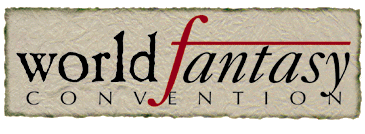 Early this month the World Fantasy Convention finished their 39th convention. The convention was filled with hundreds of published authors, nearly a hundred artists, dozens of editors, and many fans and hopeful writers looking for their big break. While this is true for pretty much every convention, the World Fantasy Convention has one aspect that I find unique and enjoyable, the number of attending memberships are limited to 850 and typically sell out early. If you can plan ahead and get a membership, you become a member to a convention that has amazing authors and well known publishers, but retains the small personal feeling you get at the smaller cons.
Early this month the World Fantasy Convention finished their 39th convention. The convention was filled with hundreds of published authors, nearly a hundred artists, dozens of editors, and many fans and hopeful writers looking for their big break. While this is true for pretty much every convention, the World Fantasy Convention has one aspect that I find unique and enjoyable, the number of attending memberships are limited to 850 and typically sell out early. If you can plan ahead and get a membership, you become a member to a convention that has amazing authors and well known publishers, but retains the small personal feeling you get at the smaller cons.
This year we were treated to Neil Gaiman acting as toastmaster and were specially treated to a guest appearance by Sir Terry Pratchett. We had about 60 publishers in attendance from all over the world willing to answer questions and talk shop. It wasn’t uncommon to see Neil walking around the bar or encouraging spontaneous musical guests to perform for us. Authors were friendly and the talk and great camaraderie was felt throughout.
With all that said, I’m sure it’s not hard to figure out why such events are great for networking. The limited numbers means you have a greater chance to talk with the people that matter and get actual feedback and opportunities to pitch your work. This is definitely why I first started coming, but I found another element to this convention that I didn’t realize until after my third year of attending. There really is a community that is formed within these smaller conventions.
I started going to the World Fantasy Convention in 2009 when it came to San Jose, California. I’ve heard of the convention before, of course, and would follow the World Fantasy Awards to see what was popular and find new books to read. As a writer looking to get published, it seemed like a good environment to put myself into. I would walk around and introduce myself. I would meet many different people, with many different reasons to attend. All were friendly, and they all treated me as a fellow author, despite being unpublished.
I knew after the first one that I wanted to attend the next, and signed up right away. Each year I would meet new people, and each year I became closer friends with the other members who attend yearly. I began to form my own community of writers from all over the world. Writers who care about my works, as I care about theirs. We encourage each other and each year I come home with renewed vigor ready to get to work and finish my next manuscript.
I don’t do it so I can join their ranks. I’m already a member of their community, and they never make me feel like less of a person for not being published. I do it because they are the people I want to be like, and just by being around them I’m encouraged to work harder for my own dreams. The convention just has the added benefit of including many of the publishers and editors that I want to see my work. The network is there to help, and the opportunities are available to those who seek them out.
The World Fantasy 2014 will be held in Washington, D.C. on November 6-9, 2014. If you don’t currently go to any conventions, it’s not a bad one to start. They welcome newcomers with open arms and the community is open to everyone of all skill levels. There are other communities around as well, and they all have their benefits. This is just the one I’ve found and I enjoy. Keep writing, and get your novel out there!

 I have a few different fingers in the publishing pie. I wouldn’t be writing for the Fictorians if I wasn’t a writer, but that’s not the aspect of publishing that dominates my time. I’m also a professional editor, something I don’t often talk about in my Fictorian blog posts. In addition, I am a typesetter. Occasionally I’ve even served as a slush pile reader, though that torturous (and tortuous) experience hasn’t always been a high point.
I have a few different fingers in the publishing pie. I wouldn’t be writing for the Fictorians if I wasn’t a writer, but that’s not the aspect of publishing that dominates my time. I’m also a professional editor, something I don’t often talk about in my Fictorian blog posts. In addition, I am a typesetter. Occasionally I’ve even served as a slush pile reader, though that torturous (and tortuous) experience hasn’t always been a high point.